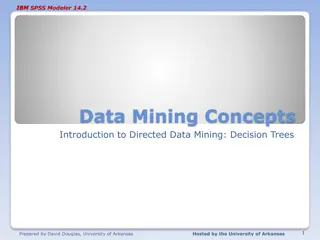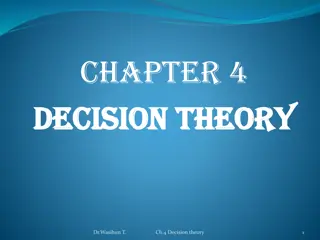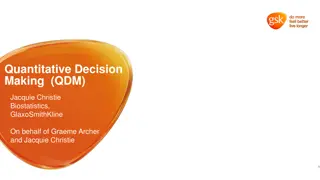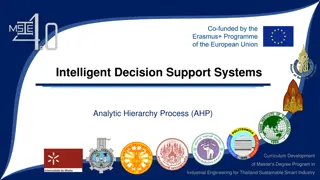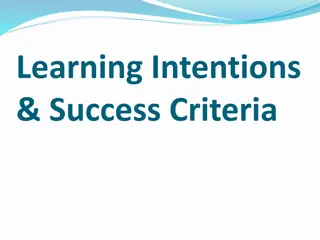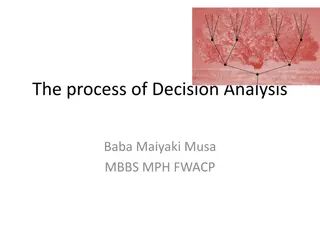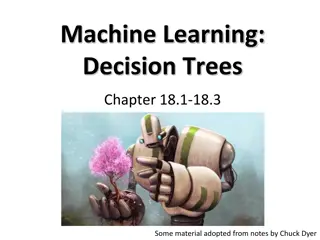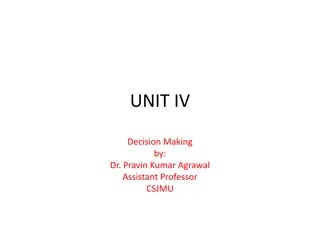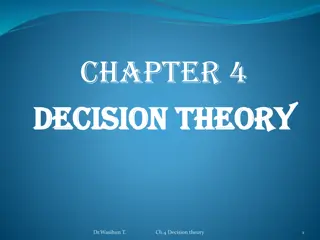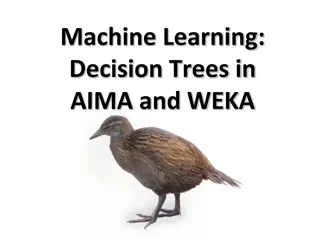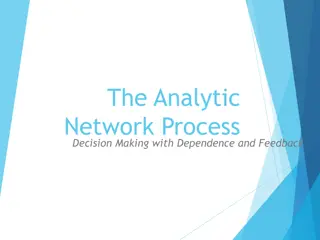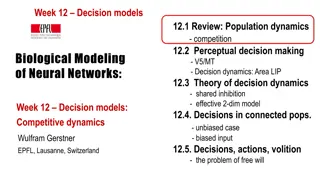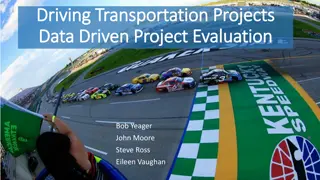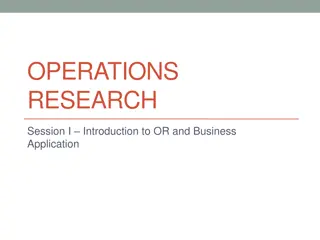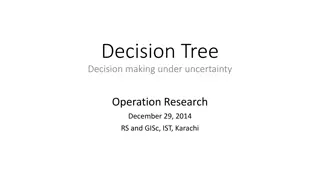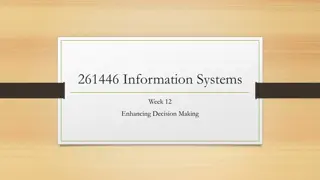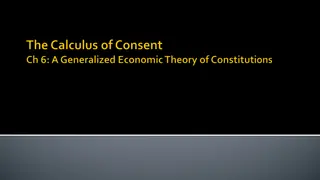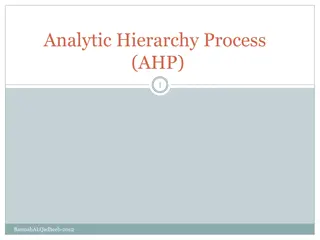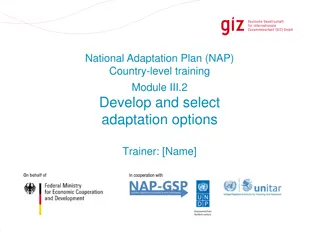Decision and Efficiency Analysis Module Overview
Gain insights into decision-making in complex business and policy settings, enhance skills in modelling decision problems, learn efficiency analysis techniques, and understand the application of data envelopment analysis. The module includes lectures, problem classes, assessments, and practical appl
2 views • 8 slides
Academic Promotions Round 2023-24: Faculty Briefing and Eligibility Criteria
Academic Promotions Round 2023-24 introduces a framework for career development emphasizing evidence, alignment with Queen Mary Values, and decision-making by promotion panels. It focuses on quality over metrics and ensures consistency and fairness through guidelines, e-learning, and HR support. Lec
1 views • 15 slides
Understanding Brain Development and Decision-Making Skills
Explore the fascinating realm of brain development and decision-making skills, focusing on how different brain regions activate during decision-making, the evolution of decision-making abilities from adolescence to adulthood, the importance of practicing decision-making skills, and the influence of
6 views • 10 slides
Enhancing Ethical Decision-Making Process in Business Administration
Explore the steps to improve ethical decision-making in business administration through a process that brings clarity and assists decision-makers in finding viable solutions. The importance of ethics, good governance, and doing the right thing are highlighted, emphasizing the value of following a st
4 views • 8 slides
Introduction to Decision Trees in IBM SPSS Modeler 14.2
Learn about decision trees in IBM SPSS Modeler 14.2, a powerful data mining concept for classification and prediction. Decision trees help in dividing records based on simple decision rules, making them a popular tool for data exploration and model building. Explore examples and understand the impor
2 views • 28 slides
Making Informed Decisions in Environmental Science
Values play a crucial role in environmental decision-making. Scientific research is essential in addressing environmental issues, but understanding values is necessary before research can begin. This article discusses how values impact environmental decision-making and introduces an environmental de
0 views • 22 slides
Understanding Decision Theory in Business: A Comprehensive Overview
Decision theory in business involves making choices based on organizational objectives like profit maximization or cost minimization under conditions of uncertainty. This chapter covers key components such as alternatives, states of nature, payoffs, degree of certainty, and decision criteria. It exp
1 views • 41 slides
Enhancing Career Decision Making Process
Explore the importance of good decision-making, types of decision makers, problems faced in decision making, readiness factors for career decisions, decision-making processes, and the CASVE cycle. Understand the significance of effective decision-making skills and how they impact our lives.
0 views • 26 slides
Understanding Quantitative Decision Making in Biostatistics
Quantitative Decision Making (QDM) in biostatistics enables optimal design of development plans and studies, quantifies decision risks, and minimizes bias. It involves setting targets and evidence levels, anchoring outcomes against targets, and establishing evidence thresholds for positive and negat
0 views • 27 slides
Analytic Hierarchy Process (AHP) for Sustainable Smart Industry Curriculum Development
Intelligent Decision Support Systems and the Analytic Hierarchy Process (AHP) play a crucial role in the development of a Master's Degree Program in Industrial Engineering for Thailand's Sustainable Smart Industry. AHP, developed by Thomas Saaty, aids in measuring intangible factors through paired c
0 views • 23 slides
Understanding Learning Intentions and Success Criteria
Learning intentions and success criteria play a crucial role in enhancing student focus, motivation, and responsibility for their learning. Research indicates that students benefit greatly from having clear learning objectives and criteria for success. Effective learning intentions should identify w
1 views • 24 slides
Understanding Decision Analysis in Work-related Scenarios
Decision analysis plays a crucial role in work-related decision-making processes, helping in identifying decision makers, exploring potential actions, evaluating outcomes, and considering various values involved in the decision. This module delves into the steps involved in decision analysis, provid
0 views • 76 slides
Understanding Decision Trees in Machine Learning
Decision trees are a popular supervised learning method used for classification and regression tasks. They involve learning a model from training data to predict a value based on other attributes. Decision trees provide a simple and interpretable model that can be visualized and applied effectively.
1 views • 38 slides
Understanding Decision-Making Process in Various Scenarios
Decision-making is crucial for individuals and organizations when selecting the best course of action among available options. This process involves considering decision alternatives, states of nature, payoffs, and using mathematical models to optimize outcomes. By identifying and defining the probl
1 views • 65 slides
Comprehensive Guide to Decision Making and Creative Thinking in Management
Explore the rational model of decision-making, ways individuals and groups make compromises, guidelines for effective decision-making and creative thinking, utilizing probability theory and decision trees, advantages of group decision-making, and strategies to overcome creativity barriers. Understan
0 views • 30 slides
Understanding the Decision-Making Process
Decision-making is the process of selecting the best course of action from multiple alternatives to achieve desired outcomes. It involves identifying decisions, gathering relevant information, and following a step-by-step process to make informed choices. Principles and steps like identifying the de
0 views • 31 slides
Introduction to Decision Theory in Business Environments
Decision theory plays a crucial role in business decision-making under conditions of uncertainty. This chapter explores the key characteristics of decision theory, including alternatives, states of nature, payoffs, degree of certainty, and decision criteria. It also introduces the concept of payoff
0 views • 41 slides
Understanding Decision Trees in Machine Learning with AIMA and WEKA
Decision trees are an essential concept in machine learning, enabling efficient data classification. The provided content discusses decision trees in the context of the AIMA and WEKA libraries, showcasing how to build and train decision tree models using Python. Through a dataset from the UCI Machin
3 views • 19 slides
Classical Blocking Test and Receiver Performance Criteria
Classical blocking test procedures such as EN 300.220-1 outline limits on power at the antenna port for receivers, with criteria for achieving desired performance levels without errors. Manufacturers must declare appropriate performance criteria for devices, even if certain performance metrics are n
0 views • 6 slides
Update on CAR T-Cell Therapy and Approval Criteria Changes
Recent updates regarding CAR T-cell therapy include details on patient referrals, treatments, and changes to approval criteria. The information highlights patient outcomes, referral processes, and criteria updates for various types of lymphomas. It also discusses the importance of monitoring and adj
2 views • 9 slides
HelmholtzCloud Service Selection Process Overview
The Helmholtz Cloud Service Selection Process is detailed through service surveys, iterations, criteria types, and exclusion processes. Service providers deliver data, weighting and selection criteria are applied, and candidate services are listed based on surveys and integrations. Criteria categori
0 views • 41 slides
Should Assisted Suicide be Legalized in China? Decision-making with Six Thinking Hats
The content discusses the decision-making process using the Six Thinking Hats method to determine whether assisted suicide should be legalized in China. Various tools and sessions are highlighted, guiding participants through considering different viewpoints, analyzing arguments, and making an infor
0 views • 12 slides
Glasgow Health & Social Care Partnership Carer Support Criteria
The Carers (Scotland) Act 2016 mandates the implementation of eligibility criteria by Health & Social Care Partnerships to address carer needs effectively. Glasgow's eligibility criteria prioritize fair resource allocation based on carers' identified support needs. Key principles include universal c
0 views • 8 slides
Nutrient Criteria Development Plan for High Rock Lake Summary Update
Nutrient Criteria Development in North Carolina has evolved through various stages since 2001, with the key milestones being the development of the Nutrient Criteria Implementation Plan in 2004 and the Nutrient Criteria Development Plan in 2014. The plan aims to link nutrient concentrations with the
0 views • 8 slides
The Assisted Decision-Making (Capacity) Act 2015 in the Criminal Justice Context
The Assisted Decision-Making (Capacity) Act 2015 introduces key reforms such as the abolition of wards of court system for adults, a statutory functional test of capacity, new guiding principles, a three-tier framework for support, and tools for advance planning. It emphasizes functional assessment
0 views • 17 slides
Analytic Network Process: Decision Making and Feedback
Explore the Analytic Network Process for decision-making with dependence and feedback. Compare hierarchical and network models, prioritize criteria in AHP and ANP, establish car priorities based on criteria, and employ feedback to link alternatives to criteria for preference. Make pairwise compariso
0 views • 19 slides
Implementing Group Decision-Making Tools with Voting Procedures at Toulouse E-Democracy Summer School
Decision-making in organizations is crucial, and group decision-making can lead to conflicts due to differing views. Group Decision Support Systems (GDSS) are essential for facilitating decision-making processes. The Toulouse E-Democracy Summer School discusses the implementation of voting tools in
0 views • 21 slides
Exploring Decision Models in Neural Networks: Population Dynamics, Perceptual Decision Making, and Theory
Dive into the world of decision models in neural networks with a focus on population dynamics and competition, perceptual decision making with V5/MT involvement, and the theory of decision dynamics including shared inhibition and effective 2-dim models.
0 views • 46 slides
Decision Analysis: Problem Formulation, Decision Making, and Risk Analysis
Decision analysis involves problem formulation, decision making with and without probabilities, risk analysis, and sensitivity analysis. It includes defining decision alternatives, states of nature, and payoffs, creating payoff tables, decision trees, and using different decision-making criteria. Wi
0 views • 27 slides
Proposal to Update New Mexico Water Quality Standards: Copper Site-Specific Water Quality Criteria for the Pajarito Plateau
Develop a proposal for the New Mexico Water Quality Control Commission to adopt EPA's 2007 recommended copper ambient water quality criteria, focusing on the history of U.S. EPA aquatic life criteria for copper, the use of the BLM tool in aquatic toxicology, and the overview of proposed site-specifi
0 views • 10 slides
Comprehensive Evaluation and Prioritization of Transportation Projects
This collection of images and information showcases a data-driven approach to evaluating transportation projects, focusing on congestion, benefit/cost analysis, safety, economic development, freight management, and asset management. The tiered prioritization system, workgroup collaboration, and proj
0 views • 11 slides
Introduction to Operations Research in Business Applications
Operations Research (OR) is a scientific approach to decision-making that focuses on finding the best solutions under various constraints and objectives. Originating from World War II military operations, OR models help optimize resources in industries like defense, agriculture, and healthcare. This
0 views • 20 slides
Decision Making Under Uncertainty Using Decision Trees
In this scenario, Colaco faces the decision of whether to conduct a market study for their product, Chocola. The decision involves potential national success or failure outcomes, along with the consequences of a local success or failure from the market study. By utilizing decision trees, this comple
10 views • 7 slides
Understanding ADHD Subtypes and Diagnosis Criteria in DSM-IV-TR
ADHD, as defined in the DSM-IV-TR, encompasses three subtypes: Predominantly Inattentive Type, Predominantly Hyperactive-Impulsive Type, and Combined Type. To meet diagnostic criteria for each subtype, specific symptoms must be present for a certain duration and at a degree that is maladaptive. Indi
0 views • 23 slides
Enhancing Decision Making with Information Systems
Explore the role of information systems in enhancing decision-making processes within organizations. Topics include business intelligence, types of decisions, decision-making processes, and managerial roles. Learn about structured, unstructured, and semi-structured decisions, different models of man
0 views • 21 slides
Stage-and-Gate Approach in Research Projects
Stage-and-Gate is a decision support framework for academic and academic-industrial collaborative research projects. It guides projects through evaluations, focusing on promising solutions while cutting out less feasible options. This approach helps in navigating the innovation funnel from the early
0 views • 21 slides
Decision Making and Constitutional Rules Behind the Veil of Ignorance
In decision-making for collective actions, individuals behind a veil of ignorance need constitutional rules to govern future decisions. The choice of rules, the expected external costs, and decision-making costs play a crucial role in determining the optimal decision-making rule. By minimizing total
0 views • 16 slides
Understanding Analytic Hierarchy Process (AHP) for Decision Making
Analytic Hierarchy Process (AHP) is a decision-making method developed by Prof. Thomas L. Saaty for handling multi-criteria problems in business environments. It involves creating ratio scales from paired comparisons to prioritize goals, criteria, and alternatives based on subjective opinions and ac
0 views • 19 slides
Developing and Selecting Adaptation Options in National Adaptation Plans: A Training Module
This training module focuses on the importance of selecting and prioritizing adaptation options in the National Adaptation Plan (NAP). It covers different assessment approaches, criteria for selecting options, decision support tools like Cost-benefit Analysis (CBA), and the necessity of prioritizing
0 views • 15 slides
Legal Implications of Challenging Private Decision Makers in Valuation Disputes
In the context of challenging private decision makers in valuation disputes, the ability of courts to set aside valuations is examined. The importance of defined criteria in decision-making processes and the history of obstacles in arbitration are discussed. Legal precedents and the role of valuers
0 views • 17 slides




